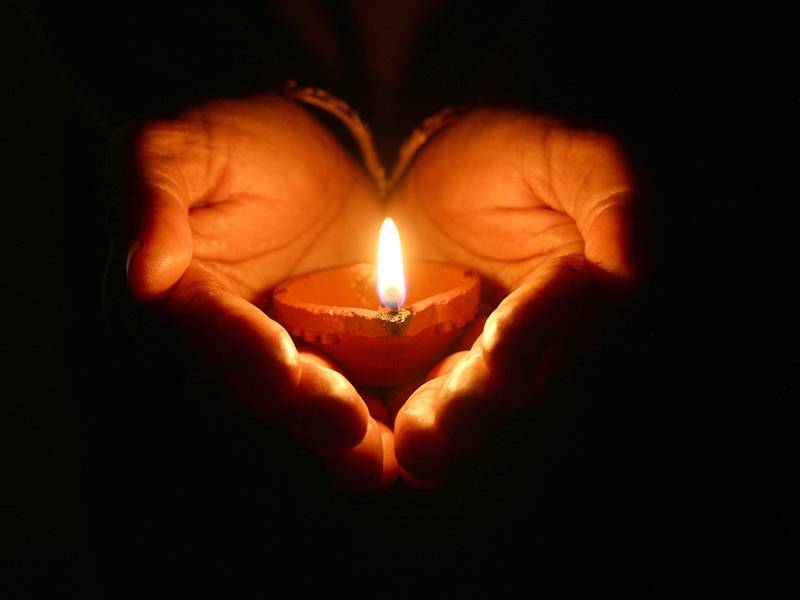Bonjour / Hello [nickname_else_first_name]
Table of contents
1) Perashat Hashavoua - Rabbi Eli Mansour
2) Halakhat Hashavoua (Halakhot related to day to day life) By Hazzan David Azerad
The Berakha Recited upon Lighting -Peniney Halacha
3) Holy Jokes!
4) For KIDS

This Week's Parasha Insight with Rabbi Eli Mansour
Parashat Vayera- The Child’s Needs Come First
Toward the end of Parashat Vayera we read the story of Hagar, Sara’s maidservant who married Abraham and bore him a child, Yishmael. Abraham was forced to send Hagar and Yishmael away from the home due to the threat that Yishmael posed to his younger son, Yishak, and the Torah tells that Hagar and Yishmael wandered in the desert. Their water rations were depleted, and Yishmael nearly died of thirst. Hagar placed Yishmael under a bush and left him there, moving a far distance away from her child, because she did not want to see him die (21:16).
Rabbi Samson Raphael Hirsch (Germany, 1808-1888) noted that Hagar’s conduct in this episode is antithetical to the model of parenting that we are to follow. Rabbi Hirsch writes that a Jewish parent never abandons his or her child, regardless of what is entailed. Hagar put her own emotions and feelings before her child’s needs, leaving him alone in his time of dire distress to spare herself the torment of watching him suffer. The proper model of parenting is one which suspends all personal feelings and emotions when the child’s needs are at stake. We must never abandon a child or deny him his needs because of our own personal concerns. Parents must be prepared to make difficult sacrifices on behalf of their children’s education and upbringing. This means being prepared to forego on certain material luxuries for the sake of paying for Torah education and providing the child with the extra help or therapy that he might need. True, it might be difficult for parents to accept a lower standard of living and forego on vacations or a luxury car in order to pay for their children’s education and, if necessary, special services. But this is the duty of a Jewish parent, which trumps personal concerns and material ambitions.
A particularly sensitive area where this issue commonly arises is Shidduchim. It occasionally happens that a boy will bring home a girl he had been dating, who is herself a worthy and suitable match, but the parents disapprove because of personal concerns, usually involving reputation and social stature. They might not think very highly of the family, or the family might have less money, and the parents will thus worry what their friends will say when they hear about the match. Of course, parents should intervene if their child wishes to marry somebody who is truly unsuitable. But they must never intervene out of personal concerns, because of their personal feelings. It is wrong to cause a child pain and abandon him to spare oneself unease.
The story of Hagar and Yishmael teaches us what parenting should not be. Our model of parenting is one which places the needs of our children before our own, being prepared to sacrifice our own wishes and desires for the sake of our children’s happiness. We don’t abandon children to spare ourselves; we remain with them, offering all the help and support their need, despite the sacrifices that this demands.

Halachot this week are selected and Translated by Hazzan David Azerad
The Berakha Recited upon Lighting -Peniney Halacha
There are two customs as to when the berakha over the candles is recited. Some say it before lighting, as the rule for all mitzvot is to recite the berakha before performing the mitzva. Thus, they first say “Barukh ata Hashem Elokeinu Melekh ha-olam, asher kideshanu be-mitzvotav ve-tzivanu lehadlik ner shel Shabbat” (“Blessed are You, Lord our God, King of the universe, Who sanctified us with His mitzvot and commanded us to light Shabbat candles”) and then light. This is the ruling of Shulĥan Arukh and the custom of some Sephardic women (SA 263:5; Yabi’a Omer 2:16).
Others recite the berakha after lighting because, according to several poskim, women accept Shabbat by invoking it in the berakha, and therefore, one who recites the berakha before lighting will not subsequently be allowed to light (Behag). To be sure, according to most poskim, as long as a woman has in mind that she is not accepting Shabbat when reciting the berakha, she may light the candles afterward. Nevertheless, women did not want to light the candles after reciting the berakha and invoking Shabbat. For this reason, the widespread custom in most communities is that women first light the candles and afterward recite the berakha, thereby accepting Shabbat. Many Aĥaronim affirmed and reinforced this custom. Nevertheless, to follow the general rule of reciting a berakha before doing a mitzva, women customarily cover their eyes while reciting the berakha and only then open their eyes and enjoy the light of the candles. This is the custom of all Ashkenazim (Rema 263:5) and some Sephardim (Maĥzik Berakha [Ĥida] 263:4, Ben Ish Ĥai, Year Two, No’aĥ 8). This was also the custom in Morocco, Iraq, and elsewhere. In practice, every woman should follow the customs of her mother’s family.
When a single man or a widower lights candles, he should make the berakha before lighting. This is because the custom of men is to accept Shabbat verbally after the Minĥa prayers, not at the time of candle lighting (SSK 43:30).
Bevirkat Shabbat Shalom Umevorach
David Azerad
3) HOLY JoKeS!!
Selection of funny snippets, loosely related to this weeks parashah or current events, to brighten your day



4) FOR KIDS

Click on the image above to open the youtube video
ACTIVITY - EDIBLE PROJECTS (click on image to go to site)
















